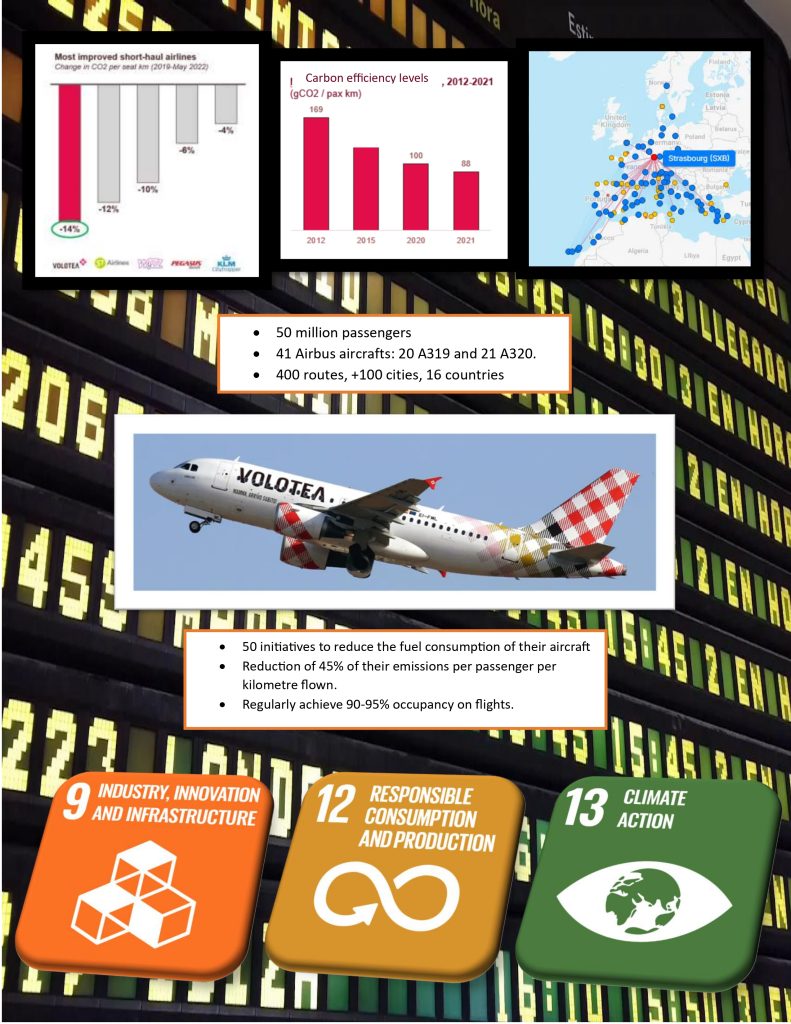22 SDG 9 Industry, Innovation and Infrastructure – Volotea
Jacob Uridil; Morgan Davies; Marta Casaño Rodríguez; Helena Núñez Rotta; Haikal Rahman; and Anonymous

Group Reflection
With the goal of filling in the gaps in the aviation network, Volotea launched in 2011 and targeted its service to mid-sized European cities that were not given enough attention by traditional carriers. This concept, however, aimed to reimagine air travel with a strong commitment to sustainability, going beyond simple connectivity. Inspired by the fact that a large portion of Europeans resided in mid-sized cities, Volotea’s executives positioned the airline to service these underserved areas with low-cost, direct flights. This creative method, embodied in the Voloterra project, shows a strong dedication to ethical consumption, production, and climate action in addition to being an economic plan. The founders of Volotea said why they were starting the company: “We wanted to create a new airline capable of covering a gap in the air network not covered by traditional players or other low-cost airlines.” This tactical realization resulted from careful investigation that showed a significant fraction of European inhabitants lived in medium-sized cities, hence generating an unfulfilled demand for effective air transportation. The success of Volotea can be ascribed to its well-defined objective of offering direct flights between mid-sized towns in Europe with an emphasis on sustainability. The Voloterra initiative’s four pillars—the business model, emission reduction, green transition, and carbon offsetting—highlight concrete steps that may be taken to create a more sustainable future.
The first pillar of Volotea’s business strategy highlights the airline’s resolve to reduce its carbon footprint by using direct flights and avoiding routes that trains might cover in less than four hours. This calculated approach ensures efficiency and lessens the impact on the environment by reducing needless air travel. With a 40% decrease already accomplished, Volotea aims to reduce emissions per passenger kilometer by 50% by 2030, as evidenced by the emission reduction pillar. With more than fifty programs in place to reduce fuel usage, the airline is a prime example of its commitment to ongoing development. Sustainable Aviation Fuels, which are introduced under the green transition pillar, reduce fuel emissions by 80% when compared to conventional jet fuel. By 2025, the last pillar—carbon offsetting—assesses 25% of global CO2 emissions. At the heart of Volotea’s business is an innovative approach to operations, which is especially apparent in their short-haul flight plan. Volotea minimizes the impact on the environment and travel time by substituting short flights for long train trips. By consuming less fuel, operating aircraft on shorter routes increases profitability. It also establishes Volotea as a leader in the expanding short-haul flight sector and attracts new customers. This creative strategy is not only beneficial to Volotea’s company but also a big step in the direction of environmental preservation. Volotea encourages passengers to prefer air travel over longer, more environmentally taxing train travels by offering speedy, affordable flight options. Reduced fuel use overall and lower carbon dioxide emissions are the immediate results of this change in consumer behavior. Beyond its immediate business activities, Volotea is dedicated to sustainability, fostering more eco-friendly travel and reducing the negative effects of transportation on the environment. Volotea stands out as a business that has achieved major progress toward accomplishing a number of goals in the framework of the UN’s global goals. Their efforts to connect European towns in an environmentally friendly way clearly highlight the importance of sustainable cities and communities. Volotea’s innovative approach to short-haul flights and sustainable aviation fuels demonstrates their devotion to industry, innovation, and infrastructure. The airline’s emphasis on ethical production and consumption is in line with international initiatives to support sustainable business practices, and its aggressive emission reduction goals demonstrate their commitment to climate action.
In summary, Volotea has established a precedent for the aviation sector with its creative approach to sustainable air travel, embodied in the Voloterra program. In addition to providing financial advantages, the company’s incorporation of sustainability into its core operations promotes more eco-friendly and effective modes of transportation. Volotea’s success story demonstrates that corporate innovation can benefit the environment and society as a whole when it is motivated by a commitment to sustainability rather than just being about profit.

